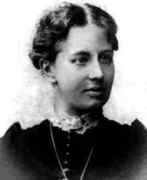◀ ▲ ▶History / 19th-century / Person: Kovalevskaya, Sofia Vasilyevna
Person: Kovalevskaya, Sofia Vasilyevna

Sofia Kovalevskaya was a Russian born mathematician who made valuable contributions to the theory of differential equations. She finished her career in Sweden.
Mathematical Profile (Excerpt):
- Sofia's name is written in different forms and we should say a little about that here.
- We need to also say a little about Sofia Kovalevskaya's name.
- She is often called Sophie or Sonya, the first being an anglicised version of Sofia, the second being a familiar version by which she was known by her friends after she became an adult.
- We will use the form Sofia Kovalevskaya throughout this biography.
- It was at a very young age that Sofia was attracted to mathematics.
- When Sofia was 11 years old, the walls of her nursery were papered with pages of Ostrogradski's lecture notes on differential and integral analysis.
- Studying the wallpaper was Sofia's introduction to calculus.
- Dostoevsky came to visit and both Anyuta and Sofia would meet him.
- Sofia had written some poetry which was shown to Dostoevsky and he praised it.
- Dostoevsky began to turn his attention more and more to Sofia and in turn she practised her piano playing to entertain him.
- At first things went well for Sofia living in St Petersburg and attending the University there.
- Following Leo Königsberger's advice, in 1871 Kovalevskaya moved to Berlin to study with Karl Weierstrass, Königsberger's former teacher.
- Sofia rushed to Paris where the Commune was being suppressed by the French army.
- Naturally, this episode made a big impression on Sofia.
- By the spring of 1874, Kovalevskaya had completed three papers.
- In 1874 Kovalevskaya was granted her doctorate, summa cum laude, from Göttingen University after it received very positive reports from Karl Weierstrass, Paul Du Bois-Reymond, and Lazarus Fuchs.
- Sofia quickly recovered and wanted to continue her academic career but, now in St Petersburg, despite having a doctorate and letters of strong recommendation from Weierstrass, she was unable to obtain an academic position.
- In 1891, Volterra discovered that Kovalevskaya had made the same mistake as Lamé, on whose work these papers were based, though she had pointed out several others which he had made in his presentation of the problem.
- In the spring of 1883, Vladimir, from whom Sofia had been separated for two years, committed suicide after he was again in financial difficulties which led to a stock scandal.
- After the initial shock, Kovalevskaya immersed herself in mathematical work in an attempt to rid herself of feelings of guilt.
- Mittag-Leffler managed to overcome opposition to Kovalevskaya in Stockholm, and obtained for her a position as privatdocent.
- During Kovalevskaya's years at Stockholm, she carried out what many consider her most important research She taught courses on the latest topics in analysis and became an editor of the new journal Acta Mathematica.
- Anna Leffler, a well-known advocate of women's rights and a writer, encouraged Sofia's literary leanings.
- After Anyuta died in the fall of 1887, Sofia felt lonely and despondent.
- Kovalevskaya entered and, in 1886, was awarded the Prix Bordin for her paper Mémoire sur un cas particulier du problème de le rotation d'un corps pesant autour d'un point fixe, où l'intégration s'effectue à l'aide des fonctions ultraelliptiques du temps Ⓣ(Memoir of a special case of the problem of the rotation of a heavy body around a fixed point where the integration is performed using the functions of ultraelliptiques time).
- Entries for the prize were supposed to be anonymous and many biographies of Kovalevskaya claim that she only won because the judges did not know the entry was from a woman.
- Kovalevskaya's further research on this subject won a prize from the Swedish Academy of Sciences in 1889, and in the same year, on the initiative of Chebyshev, Kovalevskaya was elected a corresponding member of the Imperial Academy of Sciences.
- Kovalevskaya's last published work was a short article Sur un théorème de M Bruns Ⓣ(On a theorem of M Bruns) in which she gave a new, simpler proof of Bruns's theorem on a property of the potential function of a homogeneous body.
- In early 1891, at the height of her mathematical powers and reputation, Kovalevskaya died of influenza complicated by pneumonia.
Born 15 January 1850, Moscow, Russia. Died 10 February 1891, Stockholm, Sweden.
View full biography at MacTutor
Tags relevant for this person:
Origin Russia, Women
Thank you to the contributors under CC BY-SA 4.0! 

- Github:
-

- non-Github:
- @J-J-O'Connor
- @E-F-Robertson
References
Adapted from other CC BY-SA 4.0 Sources:
- O’Connor, John J; Robertson, Edmund F: MacTutor History of Mathematics Archive
